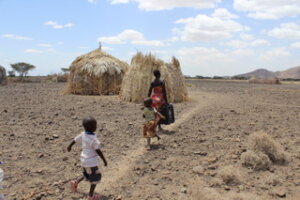NEWS
Water and Wheat - the cost of conflict and its effects in Kenya
Ongoing climate change has affected large parts of East Africa and in particular, people who already lived on scarce resources. This in combination with Russia’s invasion of Ukraine has devastating consequences for millions of people.
The acute shortage faced today in the Horn of Africa began as early as 2017, which was the start of what has become the worst drought in 40 years. People are still suffering since the drought has lasted four years. It has led to cattle and wildlife dying, scarcity of drinking water, and crops not being able to germinate. The countries where food shortages are most serious are Ethiopia, Nigeria, South Sudan, Yemen and now also Somalia and Afghanistan.
Kenya is also one of the severely affected countries, and according to WFP, this ongoing crisis has contributed to more than quadrupling the number of people in urgent need of help in the country.
The drought, together with Russia’s invasion of Ukraine, has contributed to a sharp decline in the supply of food and water, as 67% of the wheat imported into Kenya comes from Ukraine.
The cost of a food basket has already risen, particularly in Ethiopia (66 percent) and Somalia (36 percent) which depend heavily on wheat from Black Sea basin countries, and the disruption in imports further threatens food security. Shipping costs on some routes have doubled since January, WFP reports.
One of Solvatten´s implementing partners, ChildFund Kenya has projects in the most affected areas of the country. “The drought situation in Kenya is very serious, leading to food shortages in most of the counties in Northern Kenya. The most affected communities among those where ChildFund is working are Samburu, Marsabit, where we distributed Solvatten kits last year, Isiolo, Turkana, Baringo, and some parts of Kajiado”, said Issa Athuman Kipera, Programs and Sponsorships Director at ChildFund Kenya.
”At the national level, the prices of fuel, cooking gas, wheat flour, and cooking oil have increased as a result of the ongoing Ukraine-Russia conflict. Kenya and many other African nations depend on wheat and cooking oil imports from Ukraine and fuel and gas from Russia. This has put a lot of strain on the economy, leading to an increase in inflation”, Issa continued.
There is a great need for the world to acknowledge this ongoing crisis whose future potential widespread consequences are yet unknown.
Solvatten will continue to support our partners in Kenya and we are expecting the next container of Solvatten kits to reach Marsabit and other areas of the country in September. We are also starting a new project in Yemen during the summer. You can help us support ChildFund and other NGO’s by making a donation here.
P.s. Did you know that Solvatten can be used to bake bread? In order to make the yeast grow for the bread to rise, one should use warm and non-chlorinated water, which is a typical feature of the water coming from Solvatten.

Sources:
https://www.worldbank.org/en/country/kenya/overview
https://www.wfp.org/operations/annual-country-report?operation_id=KE01&year=2021#/22575
